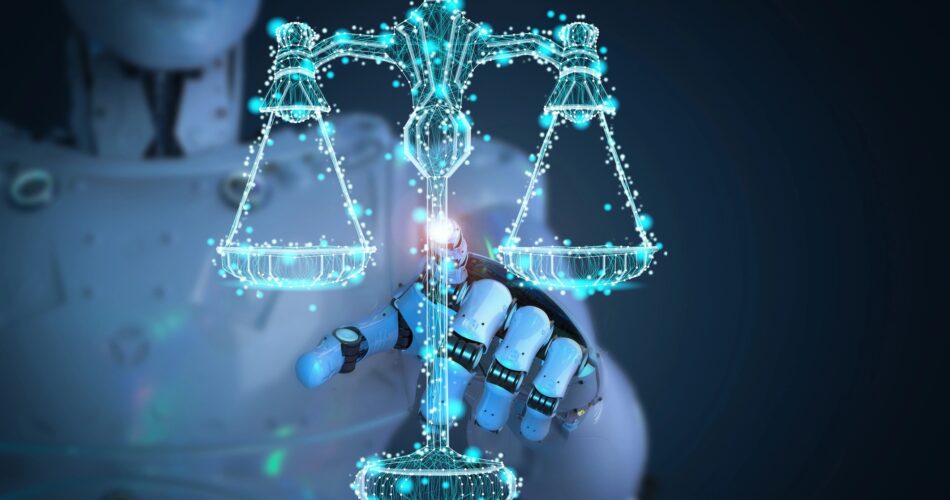The first steps in a court by AI
As reported here, in February of this year, AI will present its first-ever legal argument in a court of law. The case will be easy. It’s just a regular speeding ticket, which is presumably the main factor in the court’s decision to grant the unusual request for counsel. The defendant’s life won’t be at risk; only a small fine is at stake but it will be a chance to test how an AI will handle a real hearing.
Of course, there won’t be any robot addressing the judge and jury while roaming the courtroom; AI has advanced considerably since 2018, but not by that much. Instead, the user will receive the relevant responses to arguments made during the hearing using a phone with AI software and earphone.
Even though the AI employed here is different from the NDA-analyzing bot from 2018, This algorithm was created by the consumer advocate organization DoNotPay to assist consumers in avoiding fines, fees, and unwanted subscriptions. It can also help you get refunds from companies who seek to appear as though you have no choice but to pay for their errors.
“The DoNotPay app is the home of the world’s first robot lawyer”, boasts the company. “Fight corporations, beat bureaucracy, and sue anyone at the press of a button”.
In order to maintain a controlled environment for the experiment, the company has kept the defendant’s name and the court’s location a secret. The defendant will be allowed to say only what the bot will tell him. DoNotPay would commit to paying any fines and costs related to the lawsuit if the judge decided against the defendant.
In 2015, DoNotPay’s “robot lawyer” first appeared as a chatbot, much like the ones you get on tech support websites. DoNotPay planned to implement more advanced AI in 2020 and now it believes will be capable of effectively arguing a real-world court case in real time. Josh Browder, founder, and CEO of DoNotPay stated that he intends to use the case to improve the accuracy and integrity of his AI.
In the end, Browder wants his app to be so effective that it can drastically reduce the cost of hiring an attorney.
“It’s all about language, and that’s what lawyers charge hundreds or thousands of dollars an hour to do”, he said. “There’ll still be a lot of good lawyers out there who may be arguing in the European Court of Human Rights, but a lot of lawyers are just charging way too much money to copy and paste documents, and I think they will be replaced, and they should be replaced”.
China’s plans
Anyway, the idea of introducing AI in the law field is not an isolated case. By 2025, China plans to have an artificial intelligence infrastructure supporting its legal system. The directive intends to advance the use of AI in the legal system and improve legal services.
In a report by the state-owned newspaper China Daily, citing guidelines issued by the Supreme People’s Court, it was said that all courts must deploy a “competent” AI system in three years.
The document also claimed that all processes required for addressing legal issues would be supported by a “better regulated” and more efficient infrastructure for AI use. According to the high court, this should include comprehensive AI integration, the development of smart courts, and a higher standard of “digital justice”.
However, more sophisticated use of AI should not jeopardize national security, compromise state secrets, or violate the security of personal data, the statement added, highlighting the significance of upholding the legality and security of AI in legal contexts.
It also stated that decisions would still be decided by human judges, with AI used as extra resources and tools to increase judges’ productivity and lessen their workload in routine cases. According to the Supreme People’s Court, an AI-driven system would also increase public access to legal services and aid in more efficient dispute resolution.
It further required that courts all around the nation concentrate their efforts on learning to use AI so they could spot inconsistencies in case management.
Over the past ten years, the high court has worked to promote technological usage in the industry. In addition, in order to further the fusion of law and technology and better assist socio-economic growth, it announced plans to establish a judicial blockchain-based alliance between Chinese courts and other sectors by 2025.
In September of 2022, 350,000 mediators and more than 90,000 mediation centers joined a platform created by the Supreme People’s Court to assist lawyers in online dispute resolution. Additionally, the courts submitted more than 11.43 million cases online in 2021.
By 2030, the Chinese government promised to create an additional 50 high-tech zones for boosting the country’s GDP and enabling “breakthroughs” in artificial intelligence, quantum computing, and 5G communications. Scientists and businesses operating in the high-tech zones built the country’s first AI chip and quantum communication satellite.
Lawsuits are often expensive and take a lot of time, even when the reasons are only routine cases like fines. Therefore, in these situations, an AI lawyer could be cheaper and useful, as well as more accessible, thanks to less bureaucracy. However, the risk is that, over the years, important verdicts could be decided by artificial intelligence when it will be more part of the system. The question, more than neutrality, is the lack of depth in handling the variety of exceptions human life has. We’re having examples with automatic moderation on social media where an AI decides to ban or suspend people from their account, not always for good reasons. And it’s often hard to appeal because some decisions are unquestionable, even if you’re right. We know, that also happens with the standard judicial system but with automation, it’s hard to make your voice heard. Therefore, we need a system that allows us more to contest than to sentence.

